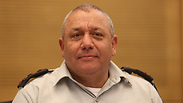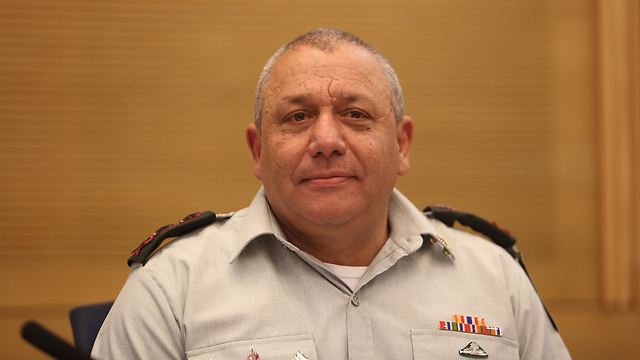

IDF Chief of Staff Eisenkot underwent surgery to remove cancerous growth
IDF Chief of Staff Gadi Eisenkot was admitted to Belinson Hospital in Petah Tikva's Department of Urology on Thursday, for a scheduled operation to remove a cancerous growth; The operation was deemed a success, and he is currently in recovery.
IDF Chief of Staff Gadi Eisenkot was admitted to Belinson Hospital in Petah Tikva's Department of Urology on Thursday, for a scheduled operation to remove a cancerous growth. Until his expected recovery next week, his duties will be transferred his deputy Maj. Gen. Yair Golan.
Following the operation, the IDF Spokerperson's Unit issued a statement, saying that he underwent the procedure to remove a local growth relating to prostate cancer. The operation was deemed a success.
Defense Minister Avigdor Lieberman (Yisrael Beytenu) announced on Wednesday that he has decided to extend IDF Chief of Staff Gadi Eisenkot's term by another year. This will bring Eisenkot's overall time as the head of the Israeli Army to four years.
Lieberman's announcement comes early—a month before Eisenkot's second year is up—and is assumed to be due to Lieberman's wish to dispel any rumors surrounding the possibility that Eisenkot would not be offered an extension, due to past statements in which Eisenkot expressed his clear criticism against Sgt. Elor Azaria.
Eisenkot is the 21st IDF chief of staff. He enlisted in 1978 and served as an officer in the Golani Brigade during the First Lebanon War, eventually becoming the brigade's commander. He also served as the Efraim Brigade's commander and as military secretary under then-prime minister Ehud Barak during Israel's evacuation of South Lebanon in 2000. During the Second Lebanon War, he was promoted to the head of the Israeli Operations Directorate, and eventually moved up to the position of deputy IDF chief of staff, under then-chief of staff Benny Gantz.
The direct reasons for the development of prostate cancer are not yet clear, but are linked to cell mutations following a break down in the prostate's oversight mechanism. It is considered a fairly common cancer among older males, and as prostate cells are rather slow to divide and multiply, it can go undetected for a long time. It might be accompanied with pain, difficulties urinating and other symptoms.
















